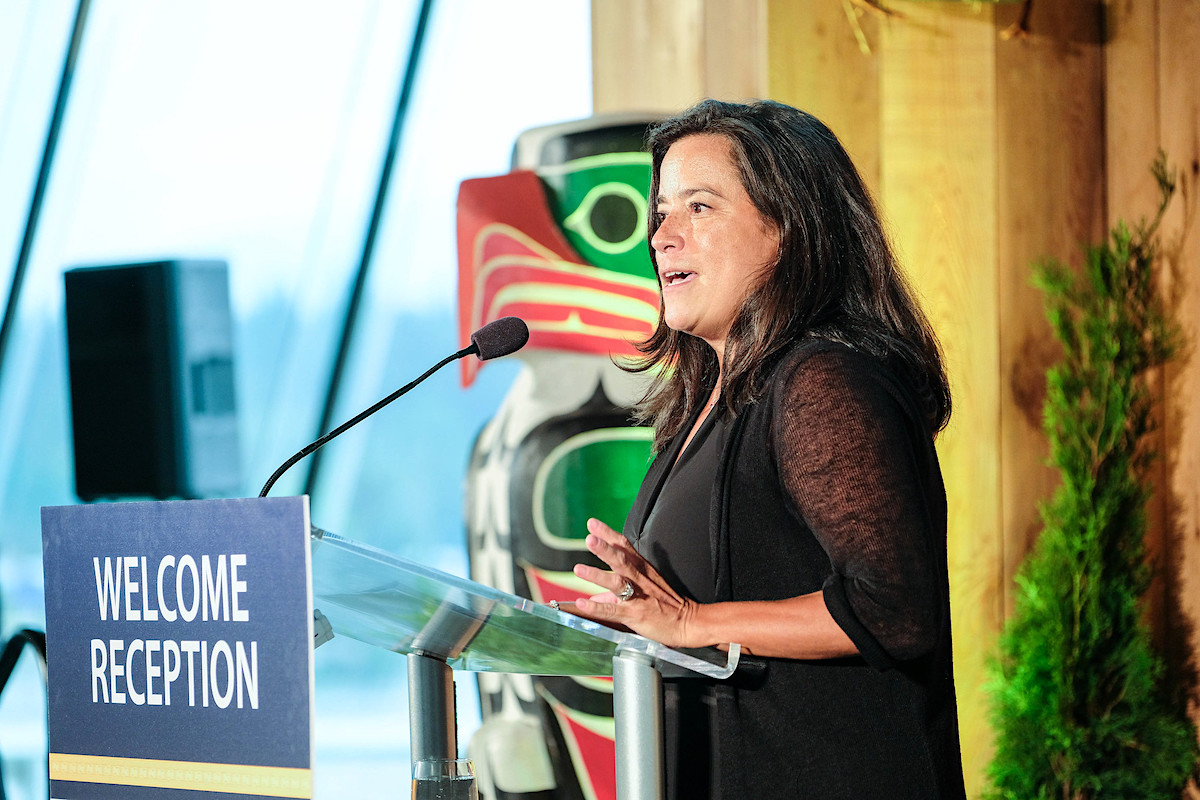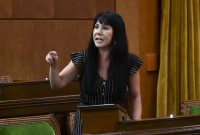Support strong Canadian climate journalism for 2025
Jody Wilson-Raybould is among 14 outstanding British Columbians awarded the province’s highest honour on Monday for exceptional contributions to society.
The Order of British Columbia is often granted in the twilight of an illustrious career, but Wilson-Raybould, Canada’s first federal Indigenous justice minister and twice-elected regional chief of the BC Assembly of First Nations, is just hitting her stride as she continues to be a force for reconciliation in Canada.
A member of the We Wai Kai Nation, the former MP spoke with Canada’s National Observer on Tuesday while reportedly basking in the sun on the porch of her family home in Cape Mudge Village on Quadra Island.
“I hope it’s not the last third of my career,” Wilson-Raybould said with a laugh.
“It’s a great honour and pretty cool to be included in such a diverse group of people.”
The recognition of her work is the result of support and the contributions of many people, and reflects the power of collective effort, she said.
That kind of collaboration across the country is a key ingredient to real reconciliation, she added.
“Everybody has a role to play in changing our current reality and working towards an improved and better future.”
The axis of the 51-year-old lawyer’s career has been advancing Indigenous rights, tackling the legacy of Canada’s colonial past and spearheading efforts to rebuild First Nations’ governance.
While regional chief, her focus was on empowering Indigenous people to take the practical steps necessary to realize the United Nations Declaration on the Rights of Indigenous Peoples and recognition of Aboriginal and treaty rights provincially and federally.
As federal justice minister and attorney general, she shepherded changes to laws and policy on medical assistance in dying (MAID), the legalization of cannabis, diversity in the judiciary, along with the recognition and implementation of Indigenous rights.
Wilson-Raybould agreed it’s interesting, and perhaps significant, that the province is recognizing someone known for holding government to account.
“Maybe it’s a recognition — particularly in this day and age when we’re living with so much turmoil — that we all have to play a role in our democracy,” she said.
After exiting the tumult of federal politics, Wilson-Raybould’s political memoir and second book, Indian in the Cabinet, became a national top 10 seller in 2021.
It details her re-election as an independent MP after her resignation from cabinet and expulsion from the Liberal caucus in the wake of the SNC-Lavalin scandal — which ended with the federal ethics commissioner finding Prime Minister Justin Trudeau had acted improperly in pressuring her to avoid prosecution of a criminal case against the Montreal-based engineering firm with global reach.
Wilson-Raybould’s third book, True Reconciliation: How to Be a Force for Change, is set to go to the printers and is due out in early November, she said.
“It answers the question I’m asked most often by people from all walks of life across the country,” she said, “which is: ‘What can I do to advance reconciliation?’”
The book details her experiences, lessons and the teachings rooted in her community. Wilson-Raybould hopes it will spark discussion and progress on reconciliation for individuals, companies or government by focusing on three practices: learn, understand, and act.
Not all the key components were apparent in last week’s Canadian tour by Pope Francis to apologize for the role members of the Roman Catholic Church played in residential schools, she said.
“I would never take anything away from residential school survivors or Indigenous Peoples that found the Pope's apology important,” Wilson-Raybould said.
“In any respect, if it was healing for them, then that is important in and of itself.”
However, given many of Wilson-Raybould’s relatives went to residential schools, including her grandmother and family matriarch Ethel Pearson, the papal apology on Canadian soil left her wanting, she said.
“I was thinking when I heard the Pope’s apology, what’s next?” she asked.
“Words are important … (but) actions matter far more.”
Political leaders have also made apologies and steps toward reconciliation have taken place, she said.
But critical changes by government to laws, policies and practice are still needed to advance true reconciliation.
“The action required to create transformative change hasn’t happened,” she said.
“And that’s what I and so many others will continue to press for.”
Two more Indigenous female leaders received the Order of British Columbia alongside Wilson-Raybould for the strength of their work benefiting the province and First Nations.
Kúkpi7 (Chief) Rosanne Casimir is being recognized for her courage in leading the community of Tḱemlúps te Secwépemc through the discovery of more than 200 unmarked graves at the former Kamloops Indian Residential School.
As representative for Le Estcwicwéý (the missing children) and an advocate for justice, reconciliation and healing for First Nations, she broadly advanced the public’s understanding in Canada, and beyond, of the ongoing legacy of the residential school system.
Kúkpi7 Casimir was part of the Indigenous delegation to the Vatican in March to discuss residential schools — resulting in the pontiff’s first historic apology at the end of the group’s visit.
Dr. Nadine Rena Caron, the first Indigenous woman to become a general surgeon in Canada, has centred her distinguished medical career on improving the health of rural, remote, northern and Indigenous communities.
She provides surgical oncology services at the University Hospital of Northern British Columbia in Prince George and is First Nations Health Authority chair in cancer and wellness at the University of British Columbia (UBC).
Caron is also a professor for UBC’s Northern Medical Program and the Centre for Excellence in Indigenous Health — which she co-founded and co-directs, and holds a faculty position with Johns Hopkins University’s Center for American Indian Health in the U.S.
Rochelle Baker / Local Journalism Initiative / Canada’s National Observer






Comments
"While regional chief, her focus was on empowering Indigenous people to take the practical steps necessary to realize the United Nations Declaration on the Rights of Indigenous Peoples and recognition of Aboriginal and treaty rights provincially and federally."
Wilson-Raybould's record on UNDRIP and protecting indigenous rights against unsustainable development is a little cloudy. Native leaders questioned her commitment.
UNDRIP stipulates that govts must obtain obtain indigenous peoples' "free and informed consent prior to the approval of any project affecting their lands or territories and other resources, particularly in connection with the development, utilization or exploitation of mineral, water or other resources."
The Govt of Canada still refuses indigenous communities the right of veto over industrial projects that threaten their health, well-being, culture, and way of life.
In 2020, The Canadian Association of Petroleum Producers (CAPP) lobbied the federal govt to delay implementation of UNDRIP.
"Justice Minister Jody Wilson-Raybould says adopting UNDRIP into Canadian law ‘unworkable’ (APTN, Jul 12, 2016)
https://www.aptnnews.ca/national-news/justice-minister-jody-wilson-rayb…
"Wilson-Raybould once called idea of bill 'unworkable'
"Conservative Sen. Scott Tannas also pressed federal officials to explain why the government was supporting S NDP MP Romeo Saganash's bill when, in a 2016 speech to the Assembly of First Nations, then-justice minister Jody Wilson-Raybould told chiefs that adopting UNDRIP into federal law would be 'unworkable' and a 'political distraction' from the 'hard work' of implementing it.
"…In separate testimony, Saganash said he disagreed with Wilson-Raybould's comments at the time. He said UNDRIP provides the minimum standard for the government's dealings with Indigenous Peoples.
"UNDRIP bill won't alter Canada's legal framework, federal officials tell Senate committee" (CBC, May 28, 2019)
https://www.cbc.ca/news/indigenous/undrip-bill-senate-committee-1.51532…
"Council of Canadians backs UNDRIP right to free, prior and informed consent" (The Council of Canadians, 2016)
"When Wilson-Raybould was a regional chief for the Assembly of First Nations, she campaigned against the Site C dam saying it '[ran] roughshod over Aboriginal title and treaty rights'. As the country’s Justice Minister, she has been silent as her government issued Navigation Protection Act and Fisheries Act permits to allow construction on the dam to continue despite ongoing First Nations challenges against the project in court.
"This summer, Grand Chief Stewart Phillip responded to this by saying, 'Rather than respecting the treaty rights of Prophet River and West Moberly and the legal process by pausing or even slowing down site preparation and construction, the Trudeau Government, like cowardly, thuggish thieves in the dark, quietly issued federal permits before a long weekend to allow for the acceleration of construction.' And earlier this week, West Moberly Chief Roland Willson said, 'My feeling right now is, if [Wilson-Raybould] had some integrity and if someone told her to be muzzled she should resign.'
"Council of Canadians chairperson Maude Barlow has stated, 'We recognize and respect First Nations’ decisions to ban tar sands pipelines and tankers from their territories and we offer our support and solidarity.'"
https://canadians.org/analysis/council-canadians-backs-undrip-right-fre…
"Ottawa won’t adopt UNDRIP directly into Canadian law: Wilson-Raybould" (iPolitics, Jul 12, 2016)
"Wilson-Raybould and her colleague Indigenous and Northern Affairs Minister Carolyn Bennett have been the target of a campaign by NDP MP Romeo Saganash to have them support his private member’s bill, C-262, which calls for Canada to make UNDRIP Canadian law.
"In May, both Wilson-Raybould and Bennett announced that Canada would no longer object to UNDRIP within the United Nations’ fora that deal with indigenous rights issues and that they would adopt the declaration in Canada, within the confines of Canada’s constitution.
"That caveat was interpreted by some — including Saganash — as a way for the government to step back from adopting UNDRIP as Canadian law as is.
…"On Tuesday, Wilson-Raybould said that a gradual process of enacting new legislation and policy based on section 35 will eventually mean that UNDRIP will be 'articulated' in law.
"'Ultimately, the United Nations declaration will be articulated through the constitutional framework of section 35,' she said.
"In reaction to Wilson-Raybould’s statements, Saganash asked in a tweet if the UNDRIP adoption announcement in May was just 'smoke and mirrors.'"
In some countries, ratifying a UN Convention means it's effective right now. Canada is not; in Canada, each statute, federal and provincial, needs to be amended or replaced, and that might ultimately mean our constitution as well.